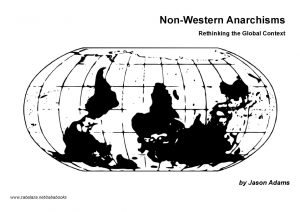
Text from the zine:
“The purpose of this paper is to help anarchist / anti-authoritarian movements active today to reconceptualise the history and theory of first-wave anarchism on the global level, and to reconsider its relevance to the continuing anarchist project. In order to truly understand the full complexity and interconnectedness of anarchism as a worldwide movement however, a specific focus on the uniqueness and agency of movements amongst the “people without history” is a deeply needed change. This is because the historiography of anarchism has focused almost entirely on these movements as they have pertained to the peoples of the West and the North, while movements amongst the peoples of the East and the South have been widely neglected. As a result, the appearance has been that anarchist movements have arisen primarily within the context of the more privileged countries. Ironically, the truth is that anarchism has primarily been a movement of the most exploited regions and peoples of the world. That most available anarchist literature does not tell this history speaks not to a necessarily malicious disregard of non-Western anarchist movements but rather to the fact that even in the context of radical publishing, centuries of engrained eurocentrism has not really been overcome. This has been changing to an extent however, as there here have been several attempts in just the past decade to re-examine this history in detail in specific non-Western countries and regions, with works such as Arif Dirlik’s Anarchism in the Chinese Revolution, Sam Mbah’s African Anarchism and Frank Fernandez’ Cuban Anarchism. It is within the footsteps of this recent tradition that this paper treads further into the relatively new ground of systematically assessing, comparing and synthesizing the findings of all of these studies combined with original investigation in order to develop a more wholly global understanding of anarchism and its history.”